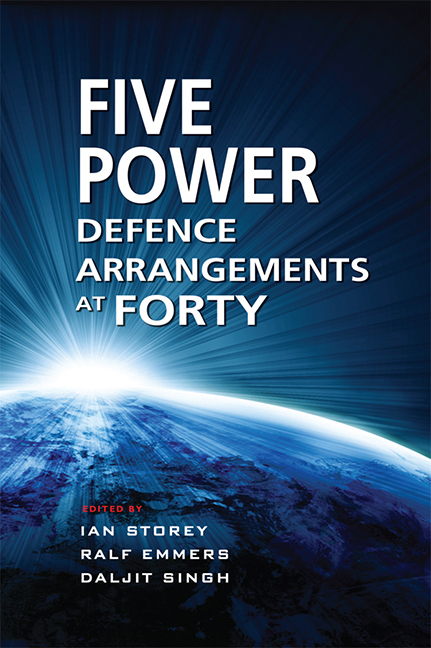Book contents
- Frontmatter
- Contents
- Contributors
- Foreword
- Glossary
- Introduction
- 1 A Little Ray of Sunshine: Britain, and the Origins of the FPDA – A Retrospective on Objectives, Problems and Solutions
- 2 On the Establishment of the Five Power Defence Arrangements
- 3 Malaysian Foreign Policy and the Five Power Defence Arrangements
- 4 The Five Power Defence Arrangements Exercises, 2004–10
- 5 The FPDA's Contribution to Regional Security: The Maritime Dimension
- 6 An FPDA Role in Humanitarian Assistance and Disaster Relief?: It's More than Just the Armed Forces
- 7 A Quasi-Pact of Enduring Value: A Malaysian Perspective of the FPDA
- 8 The FPDA and Asia's Changing Strategic Environment: A View from New Zealand
- 9 The Future of the FPDA in an Evolving Regional Strategic Environment
- Index
2 - On the Establishment of the Five Power Defence Arrangements
Published online by Cambridge University Press: 21 October 2015
- Frontmatter
- Contents
- Contributors
- Foreword
- Glossary
- Introduction
- 1 A Little Ray of Sunshine: Britain, and the Origins of the FPDA – A Retrospective on Objectives, Problems and Solutions
- 2 On the Establishment of the Five Power Defence Arrangements
- 3 Malaysian Foreign Policy and the Five Power Defence Arrangements
- 4 The Five Power Defence Arrangements Exercises, 2004–10
- 5 The FPDA's Contribution to Regional Security: The Maritime Dimension
- 6 An FPDA Role in Humanitarian Assistance and Disaster Relief?: It's More than Just the Armed Forces
- 7 A Quasi-Pact of Enduring Value: A Malaysian Perspective of the FPDA
- 8 The FPDA and Asia's Changing Strategic Environment: A View from New Zealand
- 9 The Future of the FPDA in an Evolving Regional Strategic Environment
- Index
Summary
On the 40th anniversary of the Five Power Defence Arrangements (FPDA), it is opportune to re-visit the circumstances under which the agreement came into effect on 1 November 1971. Even though London had decided to withdraw from East of Suez as announced in the July 1967 Defence White Paper, it envisaged “continued cooperation with our Commonwealth partners” in the area of security and defence. On 16 January 1968 London informed the Malaysian Government that they “wished to reach a new understanding with them about the Anglo-Malaysian Defence Agreement (AMDA) to make it fit the changed conditions”. The withdrawal plan was re-affirmed in the February 1970 Defence White Paper. Soon after in April, the defence secretary, Denis Healey disclosed that the government had proposed a new five power framework to replace AMDA and that he hoped that formal talks could start soon. In June 1970, the Labour Government was unexpectedly defeated by the Conservative Party led by Edward Heath in the June 1970 election and Healey was replaced by Lord (Peter) Carrington as the new defence secretary.
This paper focuses on the fifteen months between July–August 1970 and the establishment of the FPDA on 1 November 1971 for two reasons. First, this period was particularly critical in the formation of the FPDA. One would have thought that it was quite easy to transit from the AMDA, which had been in existence since 1957, to the FPDA but in fact this was not the case. In reality, it was a period of rather excoriating negotiations. A second reason for focusing on these fifteen months is because it (particularly the Malaysia and Singapore dimension) has never been written about in any detail.
July–August 1970 to the End of 1970
It is against the above background that about a month after assuming his post, the new Defence Secretary Lord Carrington visited Canberra, Wellington, Kuala Lumpur and Singapore from 23 July–3 August. The purpose of the visit was for “a preliminary exchange of views with the Governments concerned about our (British) contribution to future Commonwealth defence arrangements in Southeast Asia”.
- Type
- Chapter
- Information
- The Five Power Defence Arrangements at Forty , pp. 24 - 35Publisher: ISEAS–Yusof Ishak InstitutePrint publication year: 2011



